#lambert simnel
Explore tagged Tumblr posts
Note
A big ask I know. But what is some evidence that the documentary conveniently ignored to push their survival narrative?
Evidence of the death of the princes is much less conclusive, because the only contemporary evidence we have are several chroniclers abroad and in England & Wales stating that the princes were murdered or were believed to have been murdered. There is more evidence that Lambert Simnel and Perkin Warbeck were impostors, though. From the top of my head: the Sétubal testimonies confessing Warbeck was not Richard of Shrewsbury, Maximilian I's own 1488 admission to Henry VII claiming he was duped by Margaret of York into backing an impostor (only to do the same again four years later), Perkin Warbeck's letter asking his mother in Tournai for money to pay his expenses in prison in England, and comments by foreign ambassadors who understood the situation was simply international politics.
For more precise scrutinising of the evidence on Lambert Simnel and Perkin Warbeck I really recommend Nathen Amin's Henry VII and the Tudor Pretenders. He never explicitly says his opinion but the evidence he presents clearly points to a logical conclusion.
Now, one truly has to ask why Langley & co decided to discard their earlier Da Vinci code theory that Edward V lived out his days as John Evans in a small Devon village and instead chose to go with the by now often beaten theory that Lambert Simnel was Edward V. It doesn't make sense because those symbols/glass panels were the only genuine new evidence they found (even if imo it's not conclusive to Edward V's survival). The rest was already known since the 1950s.
17 notes
·
View notes
Text
2 notes
·
View notes
Text
Book Review: “Henry VII and the Tudor Pretenders: Simnel, Warbeck and Warwick” by Nathen Amin
My initial reaction of disbelief to the new ‘revelations’ regarding the Princes in the Tower has not changed, even after viewing the BBC program on US Public TV. In fact, that program was just embarrassing. There is no doubt the documents discovered and viewed are authentic and from the time period in question. Of course, Maximilian provided troops and supplies. Yes, Perkin Warbeck promised the…
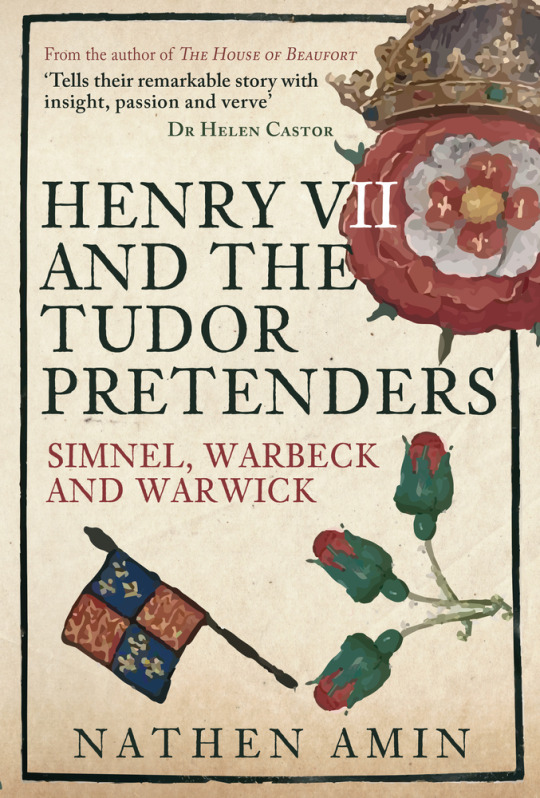
View On WordPress
#book review#books#King of England#Lambert Simnel#medieval history#Nathen Amin#Perkin Warbeck#Pretenders#Tudor dynasty#Tudor History#Wars of the Roses
2 notes
·
View notes
Text
Book Review - ‘The Pretender’ by Jo Harkin
Thanks to Knopf and NetGalley for a chance to review this novel. It’s always interesting to consider the life of the boy we today know as Lambert Simnel, and I’d never actually considered that Simnel was the real Earl of Warwick which is a suggestion made in this story. Could Clarence have swapped his real son for an imposter? The novel also posits an end for Viscount Lovell who seems to vanish…
1 note
·
View note
Text
LAMBERT SIMNEL
LAMBERT SIMNEL
c.1477-c.1535
Pretender to the English throne
Simnel was only a child when he was taken as a pupil by priest Richard Simon (Symonds) who groomed him to be king. He tutored the boy in etiquette and gave him a good education. At first he wanted Simnel to pretend to be Richard, Duke of York, the youngest son of Edward IV.
Edward Plantagenet, 17th Earl of Warwick, was executed for treason in 1499 aged 24. Simon then decided to pose Simnel as the Earl of Warwick and spread the rumour that he wasn’t executed and had instead escaped. He took Simnel to Ireland and was presented to the head of the Irish government, the Earl of Kildare. Kildare was willing to go along with the story in order for Henry VII to be overthrown. Simnel was paraded through the streets and was carried on the shoulders of Yorkist supporters and was crowned in Church as King Edward VI, in 1487, aged 10.
The Yorkist rebellion was organised by John de la Pole, Earl of Lincoln who wanted to overthrow King Henry VII of England. Henry VII was informed of the rebellion and gathered his troops, Simnel’s army consisted of Flemish and Irish troops who landed in Lancashire in June 1487 who were joined by English rebels. They came to battle at the Battle of Stoke Field and were defeated. The leading conspirators were executed, exception of Simons because he was a priest, his punishment was to be imprisoned for life
Simnel was too young to have been the real Earl of Warwick and was pardoned. Henry VII knew that the young man was just used as a puppet figure for the Yorkist rebels. Simnel was given a job working in King Henry VII’s kitchen as a servant. Simnel later became a falconer and later as a Groom of the Stool (a highly desirable position at the time). He most likely married and was the father of Richard Simnel who was a clergyman at St Osyth’s Priory, Essex during the reign of Henry VIII. Lambert Simnel died at the age of 57.
#lambertsimnel

1 note
·
View note
Text

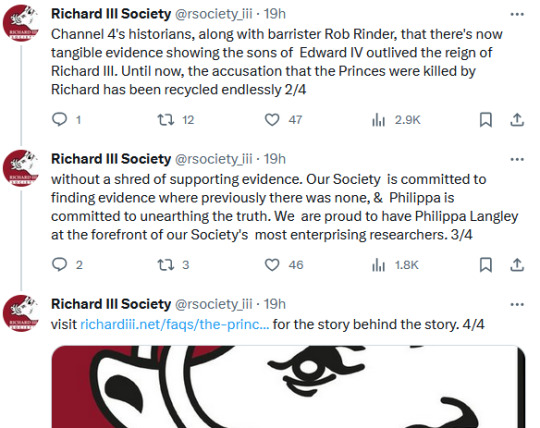
Here we go, here we goooooooooo!!!
#richard iii#TBH the FAQ page they link to does not inspire confidence but there's presumably more to it than Lambert Simnel Was Genuine#Oh And Oddly Enough So Was Perkin Warbeck#on one hand it'd be nice to finally have a definitive answer for this mystery (especially one that vinidcates King Blorbo!!)#on the other they'd better not joss that 15th century RPF that i'm definitely not writing#fanwars of the roses#history fandom#the R3 Society totally needs to get on tumblr - they have a maligned dark-haired white man on offer they'd make bank here (metaphorically)
20 notes
·
View notes
Text
A BOOK ON PLANTAGENET QUEENS-BUT WHERE IS ANNE?
A review of Plantagenet Queens and Consorts by Steven J. Corvi I am always partial to a good book on medieval English Queens. History being what it is, these women often get overlooked and sidelined unless they did something that was, usually, regarded as greedy, grasping or immoral. Therefore when I saw Steven J. Corvi’s book ‘Plantagenet Queens and Consorts’ I thought that sounded right up…
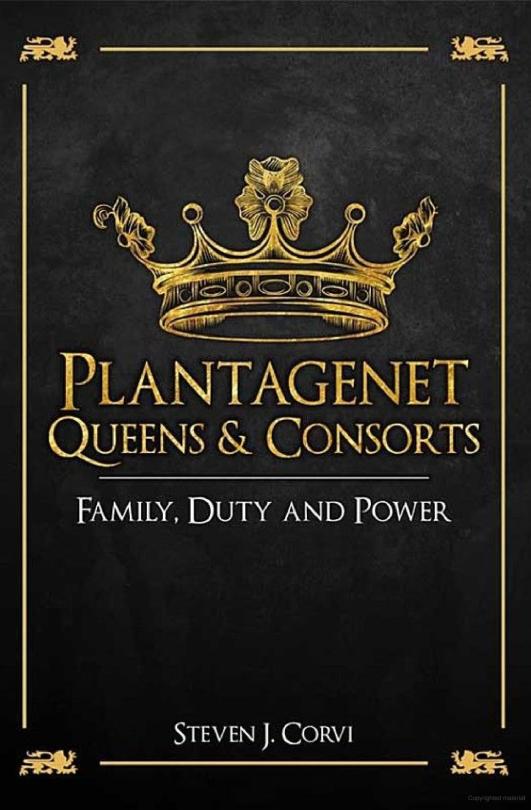
View On WordPress
#"Beauforts"#"Lambert Simnel"#"Tudor" rebellions#"Tudors"#Anne Neville#Anne of Bohemia#Bermondsey Abbey#Eleanor of Aquitaine#Eleanor of Castile#Eleanor of Provence#Elizabeth of York#Henry III#Henry VII#House of York#Joan of Kent#Joan of Navarre#John of Gaunt#Katherine de Roet#Lady Eleanor Talbot#Marguerite of France#Plantagenet Queens and Consorts#pre-contract#Richard II#Richard III
2 notes
·
View notes
Note
Do you think Gaemon Palehair really was Aegon II's bastard, or that at least Aegon III believed he was?
Maybe? On a purely practical level, at least, Gaemon being the son of the future King Aegon II does not seem impossible. Aegon the Elder was certainly living in King’s Landing at the time Gaemon was conceived, and if Gaemon’s mother was herself already living in King’s Landing (and there is no indication that she and Gaemon settled in King's Landing after the latter's birth), there was a possibility of the two meeting and conceiving a son. Even if Gaemon was not necessarily that “boy [Aegon fathered] on a girl whose maidenhood [Aegon] won at auction on the Street of Silk”, according to Mushroom’s gossipy report, this alleged patronage in the sex workers of King’s Landing on Aegon’s part may provide an explanation as to how Aegon the Elder could have fathered Gaemon. Gaemon’s pale hair, of course, could easily be read as an inheritance from his father or other Targaryen antecedents: while we don’t have full details on Aegon’s appearance, GRRM’s report that Aegon bore “a strong resemblance to his father” (who himself had a “silver-gold mustache”) certainly suggests that Aegon also had the pale hair common to Valyrian descendants. Too, it may be notable that unlike the would-be king Trystane Trufyre or the Shepherd, Gaemon was pardoned and made a ward of the crown - a rare act of mercy in the twilight of Aegon II’s reign which perhaps indicates some personal investment on the part of the king in Gaemon’s well-being.
At the same time, I would not say Gaemon being Aegon II’s son is a foregone conclusion. While we should certainly consider the fact that the information came under torture, Essie’s admission that Gaemon’s biological father was a Lysene oarsman is at least a possible explanation for both Gaemon’s existence and his pale hair. Likewise, we have no indication that Aegon II thought particularly fondly of the boy; indeed, unlike with Trystane (where it was Aegon himself who knighted the would-be squire king before the latter was executed), Aegon doesn’t seem to have interacted with Gaemon at all, and the passive voice used by Gyldayn to describe Gaemon’s pardon makes it impossible to tell who directed that decision. (Too, Borros Baratheon’s rough treatment of Gaemon at the time of his capture - “carried back to the Red Keep slung over the back of a horse, chained and weeping” - hardly suggests that he knew, or had been instructed to know, that he was dealing with a king’s son.) There is in fact some real-world historical precedent from which GRRM may be drawing for showing mercy on such a figure: when young Lambert Simnel, probably about 10 years old, was proclaimed “King Edward VI” as the figurehead of a failed Yorkist rebellion against King Henry VII, the first Tudor king showed the boy mercy, not only not executing him but actually giving him a position at court (first in the royal kitchens, and eventually as a court falconer). Nor do I read Aegon III’s affection for Gaemon as indicating some secret knowledge of the latter’s supposed royal lineage: not only would Aegon III himself have had no reason to know who Gaemon’s biological father was, but Gyldayn makes it pretty explicit that Aegon’s care for Gaemon came as a direct result of the young king’s sorrow over the (supposed) loss of his own younger brother, Viserys (and to that point, Gyldayn notes that after “Prince Viserys … became King Aegon’s constant companion” following his return, “Gaemon Palehair was cast aside and forgotten”).
Ultimately, I would say the answer doesn’t really matter, both because we’ll probably never get the objective truth on the matter and because the narrative does not really dwell on the question. Gyldayn merely refers to Gaemon as “supposedly a bastard of the missing King Aegon II” and later as a “bastard born of a whore” (and specifically used the last designation to explain why Gaemon “counted for little in the court”); there is, so far as we know, no investigation into Gaemon’s paternal origins, no allusions to his paternity (as compared to, say, Alyn Velaryon, where Willis Fell openly identified him as having “a snake for a sire”), no hints by anyone save his mother as to who might have fathered him. As GRRM himself once noted, “[w]ithout blood tests or DNA, establishing paternity was a lot more hit and miss”, and I think that’s probably the case with Gaemon. Young Gaemon's potential blood connection to Aegon II matters only in the sense that his mother seized upon it (or the idea of it) to present him as a king; if he might have otherwise grown up in obscurity as one of the many lowborn children of King’s Landing, Gaemon was instead, thanks to that claim, subjected to a roller coaster of pseudo-royalty, violent upheaval, courtly semi-protection, and ultimately horrific murder.
54 notes
·
View notes
Note
Can I have a fun fact? :3
Fun fact: the Renaissance (in England) is said as starting in the year 1485, the year Henry VII came to the throne after defeating Richard III at Bosworth field.
The year is totally arbitrary as there weren’t any drastic changes that year, but by Henry VIII we were in the Renaissance so they had to pick a year.
Bonus: the War of the Roses did not end in 1485 with the Battle of Bosworth field, but rather in the year 1487, after the failed Lambert Simnel Rebellion
#I have not done my Tudor history work btw#these are just facts I like#I need to finish that shit#Tudor#Henry 7th#Henry VII#Henry 7#Henry 8th#Henry VIII#Henry 8#Richard 3rd#Richard III#Richard 3#battle of Bosworth#battle of Bosworth field#war of the roses#fun fact#history
16 notes
·
View notes
Text
#OTD in Irish History | 24 May:
1487 – Lambert Simnel (aged 10), the Yorkist pretender to the English throne, is brought to Ireland. It is claimed that he is Edward, Earl of Warwick (Clarence’s son), but in fact, he is a baker’s son – the real Warwick is a prisoner in the Tower of London and will be executed in 1499. Most of the Anglo-Irish believe that Simnel’s claim is genuine and support him (exceptions are the Butlers,…

View On WordPress
#irelandinspires#irishhistory ireland#OTD#24 May#Éamon De Valera#Belderrig Harbour#Co. Mayo#Frank Aiken#Glens#History#History of Ireland#Ireland#Irish Civil War#Irish History#Irish War of Independence#North#Packie Bonner#Photo credit: © Colin Cafferty#Today in Irish History
7 notes
·
View notes
Note
I think your last point is very likely. There was no difference for Maximilian if (fake) Edward of Warwick was Edward IV's son or nephew, all that he needed was someone with a viable claim to challenge Henry VII. Likewise, the same thing happened with Henry when he was in France: some of the official French documentation referred to him as Henry VI's son ('fils cadet') not nephew. Whether they didn't know exactly what kind of relative Henry Tudor was, or whether they were purposely lying to boost his claim, it made no difference to the support they offered him with the intention of booting Richard III off the throne.
So what's the new evidence anyway?
Summing up the 'new evidence' about the Princes in the Tower
1. They found Maximilian of Austria's receipt (for the payment of pikes) calling Lambert Simnel Edward IV's son instead of Edward IV's nephew (Warwick) so that would somehow prove Edward V survived. They try to convince us into trusting the word of a ruler who by his own admission in 1488 claimed he was duped by his mother-in-law into supporting a fake prince and then four years later did exactly the same thing again.

2. They also ask us to believe in a survival account provided by Perkin Warbeck because it's so detailed it's 'compelling', but they won't accept the same from Thomas More, for example, regardless of how detailed or how many names are provided in More's account (the good old picking and choosing).
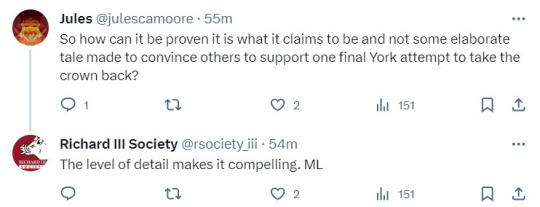
3. They present a 'Richard' signature which is supposedly such a bold statement in itself it could only be the real name of the person who wrote it, as if the man pretending to be Richard of Shrewsbury would ever sign his documents with any other name.
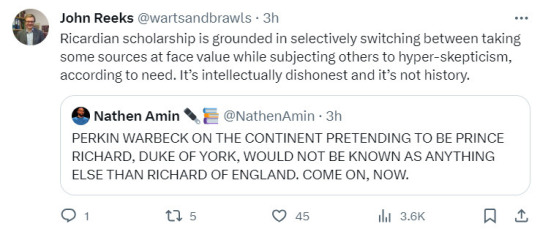
These are truly abysmally poor arguments. It's like John Reeks said: this is not history, this is a PR campaign dashed with a side of intellectual dishonesty. If your argument can't be supported by real solid evidence it's not history, it's wishful thinking.
114 notes
·
View notes
Text
The Sunnydale Herald Newsletter, Tuesday, January 7
Dawn: I've only been alive for six months, huh? Joyce: Honey, you've been alive a lot longer than that to us. Dawn: You don't know that! You don't know anything. I'm, I'm just a key, right? Everything about me is made up. Buffy: Dawn ... Mom and I know what we feel. I know I care about you. I know that I worry about you- Dawn: You worry about me because you have to. I'm your job. Protect the key, right? Buffy: I worry because my sister is cutting herself! Dawn: Yeah? How do you know? Maybe this is just another fake memory from my fake family. Joyce: Sweetheart- Dawn: Get out. Buffy: Dawn... Dawn: Get out, get out, get out!
~~Buffy Season 5 Episode #91: "Blood Ties"~~
[Chaptered Fiction]

Queen of Hearts Ch. 4/7 (Cordelia/Willow, unrated) by Murderpart1
The Buffy Chronicles: Life After Sunnydale Ch. 19 (Buffy/Spike, E) by sweetmelodykiss
The Evil that Men Do: Ch. 12/12 (COMPLETE) (Willow/Tara, Willow/Kennedy, E) by VladimirHarkonnen (TheLightdancer)
Forged in shadows Ch. 18/26 (Angel/Lindsey, E) by CloudSeeker

Ripples, Chapter 7 (Buffy/Spike, T) by violettathepiratequeen
The Big Bad...Poodle?, Chapter 6-7 (Buffy/Spike, M) by EnchantedWillow

The Yellowstone: A Safe Harbor Ch. 13 (Buffy, T, Yellowstone xover) by Buffyworldbuilder
[Images, Audio & Video]

Video: Stop Motion Buffy Intro () by josephsbrett

Artwork:he’s just a good listener is all () by yarboyandy
Artwork:Willow (Alyson Hannigan) and Cordelia (Charisma Carpenter) () by spookyrabbit87
Artwork:Drusilla & Spike () by sadgollum-blog
Artwork:Faith () by sideartblog999
Artwork:Buffy & Faith () by lambert-simnel
Artwork:Connor () by artsying-ifer
[Reviews & Recaps]

Might be my second favorite season | Season 5 in review by The_Fullmetal_Titan

PODCAST: BTVS 609 - Smashed by Another Buffy Podcast
PODCAST: ANGEL 1.7 - The Bachelor Party by Buffy the Vampire Straya
PODCAST: Episode 133: Seeing Red by Mythtaken
PODCAST: Episode 134: Villains by Mythtaken
[Community Announcements]

Tuesday Prompt: Objects by comment_fic

We are celebrating the start to a new year with new features. by elysianfieldsarchive
[Fandom Discussions]

ok I’m only on season 5 but can someone explain to me how Xander is the universally hated one by sunny-rants
what did you think of the buffy musical episode by theloopus
Given how obviously unintentional it all is, it’s very funny that we see Willow dealing with a serious break-up twice on the show by coraniaid
I remember losing my mind seeing the first kiss between Buffy and Spike and it is still perfect all these years later. by autumnknight
Normal person: I had a sex dream about someone by darktragedyharmony
Let’s all be fr now if Joyce could’ve chosen a son in law out of all buffy’s options it would’ve been spike by darktragedyharmony
I once saw a quote that said the idea for Buffy came from subverting the horror movie trope of ‘woman is attacked in dark alley’ by pearlofthewoods
I bloody love the relationship between Wesley and Giles. by sadmountaingoat
Smutty Sunday Recs by februaryfangfest
The “subtle foreshadowing” for dawn by darktragedyharmony
I’m posting about Xander a lot by snakey-sorrow
Actually re: Faith meeting Wood and immediately starting to talk about Buffy by explosionshark

Most cringey scenes ever in BTVS? by Multiple Authors

Does the Hellmouth encourage violent behavior in Sunnydale in non-demons? by American Aurora
Buffy/Faith by FallenAngel00

It’s not perfect but I think I got pretty close. by AnyReasonWhy
Femme Fatale by Trixieswizzle
Life Serial question by Tuxedo_Mark
One of the best lines in the show by jdpm1991
finished s2 and made some “buffy characters as reductress headlines” memes by daisie_darlin
I have no words for this… | “The Body” S5 E16 by The_Fullmetal_Titan
In a museum in Seattle by HolocronSurvivor80
Why didn’t they give Dawn friends? by Toya1988
Why the Riley hate? by Miguelify64
The Body by Pitiful-Talk-7798
Any Buffy crafts here? by Cortzee
s6e17 Normal Again messes with my head by mydogislife_
Spike by
Scooby gang should have kept BuffyBot by Hot_Assignment4150
I F**cking HATE Connor by Hellmouthgaurdian
Spike vs Angel by Top_Detective_346
Buffy’s earrings S7 E15 by panikyfeel
Why do people still bury their dead in Sunnydale? by samof1994
could they ever be serious? by thunpnz
What if: Jenny Calendar survived? by conquermaster35
What's the cringiest or most embarrassing scene in BTVS or ATS? by direinde
Where Exactly is Sunnydale? by Traditional-Sort2385
What do you think everyone’s middle names are? by AntRose104
Angel Rewatch Ascendency by ATH3NA01
Do you agree that Spike and Angel are the Hottest Male Vampires of All Time and Why? by Amber_Flowers_133
[Articles, Interviews, and Other News]

PUBLICATION: All 12 'Buffy the Vampire Slayer' Season 1 Episodes, Ranked by Collider
PUBLICATION: How Buffy The Vampire Slayer Star Ruined Your Favorite Romantic Scenes by Giant Freaking Robot
PUBLICATION: Buffy the Vampire Slayer Houses Some Awful Characters, But It Quietly Redeemed Its Most-Hated Character by Screen Rant
Submit a link to be included in the newsletter!
Join the editor team :)
5 notes
·
View notes
Text
Foundling names
At the Foundling Museum they have displays listing some of the new names given to the Foundlings when they arrived.

I was struck by how many of these were literary, historical or fanciful - a projection of the donors' fantasies on children - was this a kind thing to do or treating children a bit like naming a puppy? What did it mean to go through life saddled with the name Oliver Cromwell or William Shakespeare?
Names included:
Historical: Julius Caesar; Edward Plantagenet; Lambert Simnel; Edmund Ironside; Henry Agincourt; Emma Plantagenet
Tudor: Charles Brandon; Catherine Parr; Walter Raleigh; Francis Drake
Civil War: Oliver & Richard Cromwell; Edward Montagu; William Chillingworth
17thc/18th: Gilbert Sheldon; William Orange; Billy Culloden
Admirals: Admiral Benbow and Coram Benbow; Cloudesley Shovel
Literary: Robin Hood; Tom Jones and his love Sophia Western; Geoffrey Chaucer; Phillip Sydney; Alexander Pope; Nahum Tate; Samuel Johnson; William Shakespeare
Artists: Michael Angel; Inigo Jones; William Hogarth (possibly a bit confusing given his association with the hospital?); Anthony Vandyke; Peter Paul Reuben; Christopher Wren; Godfrey Kneller; Mary Addison; Richard Steel; John Dryden
Scientists: Francis Bacon; Edmund Halley
Virtues: Hopegood Helpless (a bit of puritanism coming in there perhaps?); Diana Thrifty; Prudence Friendly
Birds: Mary Dodo; Mary Swallow; Deborah Lark
Interesting to see one John Doe on the list as well - I thought this was a later, American thing.
4 notes
·
View notes
Text
i knew the lambert simnel thing was going to be insane and there is a reason very few ricardians have claimed he was actually edward v

so first of all look at this, this is how she presents her "evidence" this is just NOT how you write a history book starting off with "king edward has now been positively identified" NO HE HASN'T you can not be approaching your sources like this and claim this is a good faith endeavor for the "truth" and not just hackish ricardian propaganda, which it what it is
she then goes on to claim, with no evidence, that simnel's claim to be warwick was made up by henry vii and in her book she is showing there was confusion on who simnel was claiming to be edward v or warwick, she also claims henry vii made up the date of simnel's "coronation" in dublin from the 24th of may when it was really the 27th because monarchs were crowned on sundays, she cites absolutely no evidence of this claim, she also claims that simnel's later life as a kitchen boy then a falconer was also invented by henry vii, again no evidence supporting this theory
8 notes
·
View notes
Text
new conspiracy theory: perkin warbeck, lambert simnel, and the earl of warwick were ALL richard duke of york
2 notes
·
View notes
Note

Sorry if it's a dumb question. But if people say Lambert or Perkin were the Princes, why did they wait so long to come back?
Richard stole their birthright slurred them their mother and sisters as a whore and bastards. So why the hell did they never appear in his reign and get an army? Yeah it's a short time and they were young but no one's asking them to fight. Plenty of men would've helped.
Like if everyone thought they were dead, Henry's sorta avenging them by killing Richard and marrying Elizabeth. He's the good guy! So why wait.
The best explanation I have is Richard was holding them, and would've kept them in prison until they died, but when Bosworth happened someone let them out.
I mean, if they lived, wouldn't taking two boys hostage, killing protective male family, and never letting them see their mother again, and never have any life at all, be pretty shitty behavior as it is?
So it's kind of a paradox. If Richard didn't kill them, even if they weren't Perkin or Lambert, he was expecting to leave them in jail forever. So he ruined their lives and was cruel for no reason. If he was ready to hurt two children, he sounds like the type of guy who would finish the job and kill them.
So if I follow the whole "they survived" theory through, Richard ends up sounding guilty anyway.
Well, do you know why Lambert Simmel's revolt never happened during Richard III's reign?
Because the rebellion was made by Ricardians. It's Richard III's sister funding mercenaries led by Richard III's former Lieutenant of Ireland/nephew and his former best friend, landing on Richard III's stronghold and attracting Richard III's former supporters (the Harringtons, Broughtons, Scropes).
Lambert Simmel being Edward V. Makes. No. Damn. Sense.
As for Perkin Warbeck, the fact that he waited years speaks volumes on his authenticity. He was aware that this was an issue, hence his justifications about his brother Edward V being killed by people whom he does not name the sponsor before being put in custody by said killers who seemingly have no trouble killing a 13-year-old but think it's too immoral to kill a 10-year-old. Then they free him after a bunch of years in Flanders.
Two options: either they work for Richard III, in which case they should have no trouble freeing him after he gets killed. Either they work for the Tudors/Tudor-linked, in which case he wouldn't ever be free. What convince me that Perkin Warbeck isn't Richard of Shrewsbury is his own weird version of events, not whatever his opponents said.
And indeed, it's to vindicate Richard III but less as an innocent man than a victim of his time. In the long run, they can't canonize him, considering many of his past deeds. But what they wanna do is pin the portrayal of someone unfairly treated by his contemporaries and posterity. Using a famous mystery in which one can muddy the waters enough to instigate doubts is great for them because then, they can avoid talking about his career as a duke, his actions as a general or his very real ambitions and aspirations. I do not get their hyperfixation on Richard III & morality. I personally outgrew it when I was 16 years old. Richard III doesn't interest me for that. Their picture of a martyred (?), progressive (??), proto-socialist (???) Duke of Gloucester is so strange it's a bit fascinating.
14 notes
·
View notes